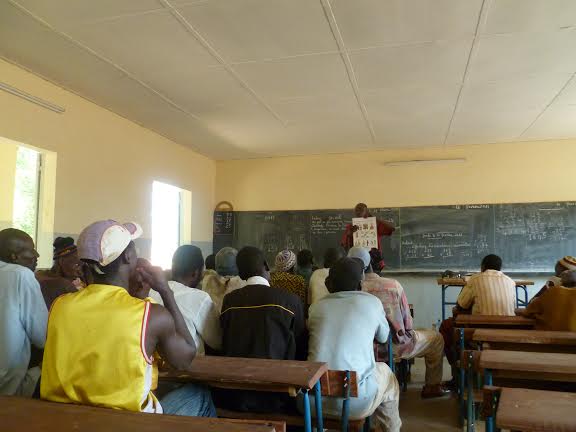Brief 06: Voter Benchmarks in Developing Countries
EGAP Researcher: Jessica Gottlieb
Geographical Region: Africa
Research Question:
Do civics courses in Mali help citizens hold their politicians accountable?
Preparer: Seth Ariel Green
Background:
Prior research in India, Mexico and Brazil has indicated that more information about local politicians’ performance is insufficient to make voters throw out corrupt or ineffective representatives. The problem may be that voters do not have what Jessica Gottlieb (2013) calls a “reasonable reference point” for what their leaders can do or should be doing. They might not know who is responsible for what services, what budgets are available, or how other, comparable governments perform. Gottlieb’s experiment tests whether fixing these ‘information asymmetries” increases voters’ proclivity to vote against poor-performing politicians.
Mali, with a per capita income of $500 and a literacy rate of 24%, has been democratic since 1992, and has a high degree of decentralization and a commune-based government. This allowed Gottlieb to manipulate voter information levels on a village by village basis.
Research Design:
The sample is 95 rural communes, each consisting of approximately 18 villages averaging 1000 inhabitants each (though only 6 villages were randomly selected into the sample). Of the communes, 31 were randomly assigned to the control group, 32 to the first treatment group, and 32 to a second treatment group. There were 370 treated villages in total. The first treatment group was given two civics courses that taught participants about local governments’ responsibilities in providing public goods. The second treatment group received those two courses and also a third on how local governments perform relative to neighbors. Communes in the control group received no courses.
Participation in the civics courses was voluntary. Gottlieb measures outcomes through a survey of 10 households per village, chosen independently of whether households attended the civics courses. Of the 10, 6 were randomly selected and 4 were targeted at villages’ local leaders. The survey asked about levels of civic knowledge, beliefs about government capacity, and respondent behavior in voting simulations. Gottlieb also had trained observers attend subsequent village meetings and record how often villagers spoke up to challenge local leaders.

Results:
Both treatment groups increase voters’ expectations of local government performance. In the second treatment group, those with high-performing governments have significantly higher expectations, while those with worse governments show essentially no effect. In voting simulations, respondents in treatment villages report that they would need to be paid more money than control respondents to sell their votes to an ineffective politician. Voters in treatment village were more likely to select hypothetical candidates based on performance rather than a local chief’s endorsement or a kinship connection. Both effects are larger for the second treatment group. To supplement these surveys, Gottlieb measured whether villagers in the treatment condition were more likely to petition local leaders during town hall meetings. Treated villagers were more likely to speak up by about half, although the sample size was not large enough to say that this did not occur by chance.

Lastly, Gottlieb surveyed leaders from each of the villages on their prospective campaign strategies. Politicians in treated villages said they were less likely to promise political transparency when campaigning. The treatments also reduce the number of commune council meetings that leaders hold.
Policy Implications:
When setting up civic institutions, policy-makers should keep in mind that knowledge about what politicians can or should be doing makes voters less likely to reelect or elect inefficient or corrupt politicians. NGOs that distribute information about competing politicians in the developing world generally can also include information about those politicians’ responsibilities, and whether local governments outperform their neighbors. In Mali specifically, donors and government officials wishing to discourage corruption should tell voters exactly what services they are entitled to and by whom, and also ensure that politicians know that such information is public.
One caveat to this research is its differential effects by gender. Gottlieb (2014) notes in a follow-up paper that while men in treated villages were more likely to participate in their communes’ civic life; women were less likely to do so. Gottlieb writes that there is a “commonly held belief among both men and women that politics and civic life fall under the purview of men,” and that female inclusion in the civics themselves may create a backlash against female participation in politics. This suggests that civic education alone is not enough to overcome unequal gender norms, and should perhaps be given in conjunction with interventions that foster gender parity.
References
Gottlieb, Jessica. 2013. “Greater Expectations: A Field Experiment to Improve Democratic Accountability in Mali.” Draft available: https://sites.google.com/site/jessicaagottlieb/research/Gottlieb_voting.behavior_12.3.13.pdf?revision=1
Gottlieb, Jessica. 2014. “Why women participate less in civic activity: Evidence from Mali.” Draft available http://mgape.files.wordpress.com/2013/06/gottlieb_civic-behavior.pdf